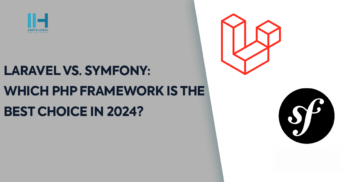Greetings! I'm Aneesh Sreedharan, CEO of 2Hats Logic Solutions. At 2Hats Logic Solutions, we are dedicated to providing technical expertise and resolving your concerns in the world of technology. Our blog page serves as a resource where we share insights and experiences, offering valuable perspectives on your queries.

Laravel is one of the most used frameworks within the PHP ecosystem. It is a robust yet easy to understand open source PHP framework that follows a model-view-controller design. You can rely on no-code website builders if you want to establish something straightforward, like an online store or portfolio. A no-code solution may not be adequate if you want to develop something more complex. Choose a framework instead, then begin creating code with it. When choosing an open-source framework for building contemporary web apps at scale, Laravel is a wise option.
What is a PHP Framework?
To dwell a bit deep into the subject of what Laravel is, first let us understand what a PHP framework is. Simply put it is a set of code databases with valuable functionality that are pre programmed. These functionalities/tools include authentication tool, rooting tool, and HTML templates; these help to allow users to build web applications much faster.
The PHP framework that is in Laravel levels up the web development process and enhances the overall quality of the end product.
Is Laravel frontend or backend?
To answer the question of Whether Laravel is a front-end or back-end, the right answer will be: though it has front-end capabilities Laravel is actually a backend development framework.
Laravel is primarily a backend PHP framework. It’s used to develop the server-side logic of web applications, handling tasks like routing, database interactions, and authentication. However, Laravel can also be used for frontend tasks to some extent, especially with the inclusion of Blade templating engine for generating HTML
To add in engagement features to the code, Laravel comes equipped with front-end style building tools like Validation systems, dynamic queries, pagination, etc.
Why use Laravel for Web Development
The most relevant reason to choose Laravel is the ease of use, even for those not well-versed in coding language.
Apart from this here are a few reasons for you to consider while making a decision
Ease of Use
Laravel helps to build web applications much faster and once completed the code base is well structured and easy to maintain.
Adaptable
Web applications created and developed using Laravel are seen to be highly scalable with a well-structured code database. Equipped with a modular packaging system and strong dependency management it allows the developers to expand/ upgrade the functionality of their apps much easier and even faster.
Universal / Versatile
The PHP framework of Laravel is highly popular among web developers. The universal nature of its framework enables it to be the best choice for various industries including Medicine, IT, entertainment, Finance, etc. It can be used to build social networking sites, e-commerce websites, static or dynamic websites, content management systems, etc.
Built-in Tutorials
Developed to make the lives and tasks of developers easier, the creators of Laravel has ensured to make everything about Laravel developer-friendly and easy to comprehend. Every version of Laravel with clear instructions and tutorial classes, coding styles etc.
Time-Saving
Laravel reuses the components from other frameworks while developing web apps this helps to save time and creates better efficiency.
The Best Security Features of Laravel
When developing/creating web applications the major concern is always “Security”
With regard to user authentication, malware, and even data breaches the security of our websites and applications is no laughing matter.
Here comes the major highlight of using Laravel for your web development. It contains various useful security features to ensure our websites and web applications are safe and secure.
Here are some of the best features of Laravel you can use to safeguard your applications.
Following are the security features offered by Laravel for developers to ensure they can reduce “Laravel Vulnerabilities”
Laravel Authentication System
Authentication and permission are included into Laravel as default options. You can build up dependable and strong authentication and permission for your web app with only a few Artisan commands.
A very common issue that can arise and lead to XSS and supporting file problems is Laravel Hacking. The most common occurrence of hacking is when victims are being redirected to different and malicious websites.
To protect users from such instances Laravel has a powerful authentication mechanism in place. Laravel uses Providers and Guards to make the authentication process better. Setting up the authentication process is complex-free, all a developer needs to do is set up the database, controller and modules. The software has authentication mechanisms that will be implemented by default during the process.
Reducing Cross-Request Forgery
Cross-Site Request Forgery, often known as CSRF, is a tried-and-true hacking technique that involves convincing a user to do something they don’t seem to want to. The hacker partially avoids the same-origin restriction, which prohibits tampering between two websites, by doing this.
Laravel keeps track of all active user sessions and generates a CSRF token for each one automatically. The Form Classes Token Method is used by Laravel and is enabled by default. The source code makes the token and a built-in CSRF filter transparent.
Protection Against XSS
In XSS attacks, hackers access your website using text-based javascript code, and once they have access to all of the website’s visitor data, they basically use it for their own malevolent purposes. In the end, Laravel Security features already aid in preventing XSS attacks on code. The database is automatically protected by this feature. Any code that contains escape tags is regarded as output HTML.
SQL Injections
We must link each parameter to a SQL query in plain old PHP. But with Laravel, we have the query builder and Eloquent ORM, which by adding param binding by default, automatically protects against SQL injections.
Password Hashing
A native hashing system built into Laravel uses Bcrypt & Argon2. You can set Bcrypt as the default mechanism for storing user passwords, registering users, and authenticating users by using Laravel’s built-in login (LoginController) and register (RegisterController) classes.
Security Features to Secure your Laravel Apps
The above mentioned were the built-in security measures offered by Laravel to safeguard your web applications. Now let us look into some other steps and measures we can follow to enhance the protection and security of our applications.
Cookies protection
Laravel will automatically create a new application/encryption key for you when you navigate to your configuration directory. For double protection, it is typically advised to alter it to a challenging, randomised password with at least 32 characters. The likelihood of the breach must be as low as possible.
Password Hashing
As previously mentioned, Laravel offers a built-in hashing system based on Bcrypt and Argon2. For Laravel, the basic rule is that slow hashes are better hashes. Therefore, it would be beneficial if you took care to avoid using weak hashing algorithms like MD5 and SHA1.
Use of in-built encryption
The best way to protect your web application is via Laravel’s built-in encryption, just like when hashing passwords. As a result, it is strongly advised to utilise the built-in encryption rather than creating your own, as the developers of the framework cannot ensure its security.
Clearing HTTP sessions
A considerable amount of user information is stored in HTTP sessions. Destroying sessions after any substantial state changes to the web app, such a password reset or security update, is therefore vitally essential.
Laravel Purifier
Since it will tie up the code and manage any missing codes, HTML Laravel Purifier is used to produce HTML variables from databases for customers.
HTTPS instead of HTTP
Hackers could readily access passwords when they are transmitted in text on a website that is deployed on HTTP. Therefore, with the aid of a laravel developer, your web application should be transferred to HTTPS format in order to protect Code.
Keep plugins updated
It is strongly recommended that the security practises of Laravel plugins and modules be updated on a regular basis. Laravel versions contain the most recent security updates and algorithmic enhancements. During updates, completely outdated and obsolescent library laravel security features are removed, and new ones with improved quality and additional features are made accessible to you.
Make use of Laravel Security Packages
Laravel provides a number of security packages to enhance the security of websites and applications.
Laravel security component: This component integrates Laravel with the Symphony security core to protect roles and objects.
Laravel security is primarily used to protect against XSS vulnerabilities. It is accomplished by incorporating Codeigniter 3 into Laravel 5.
Laravel ACL: It protects applications from routes and CRUD controller methods, ensuring that the authentication process is safe for the application.
Conclusion
To wrap it up, Laravel is a powerful PHP framework for developing mobile and web applications. Laravel security features provide complete defence against third-party attacks. These security features are simple to use in comparison to older security features.
The most important thing is to keep your Laravel and other software up to date, to be cautious about verification security, to always filter user information, and to try to devise a strategy for regular reviews of your Laravel security posture.
Following these instructions will help to ensure the security and privacy of your users’ information. There are numerous other things you could do to strengthen the security of your Laravel development services. Nonetheless, the framework significantly improves application security by eliminating these various attack vectors via its best inbuilt Laravel security features. These features have been carefully designed to meet all of your application security requirements.
FAQ
Why choose Laravel for web development?
Think of Laravel as a pre-built toolbox for building websites and apps. It's packed with features that make development faster, easier, and more secure, even for beginners. Plus, it's flexible enough to handle anything from simple blogs to complex e-commerce platforms.
How secure is Laravel?
Laravel takes security seriously, offering built-in features like bulletproof authentication, protection against common hacking techniques, and secure password storage. It's like having a security guard for your app, working 24/7 to keep bad guys out.
How can I make my Laravel app even more secure?
While Laravel has your back with its core features, you can add extra layers of protection. Think of it like putting an alarm system on your house. Update your Laravel and software regularly, use strong encryption, and consider additional security packages. Remember, security is an ongoing process, so stay vigilant!
Is Laravel easy to learn for beginners?
Absolutely! Laravel is known for its clear structure and tons of learning resources. It's like having a helpful teacher guiding you through the process. While some basic coding knowledge is helpful, even beginners can get started and build secure, functional apps.
Is Laravel the best PHP Framework?
Laravel is widely regarded as one of the best PHP frameworks due to its rich features, ease of use, extensive documentation, and active community support. However, whether it is the absolute best framework depends on specific project requirements and developer preferences.

Related Articles







